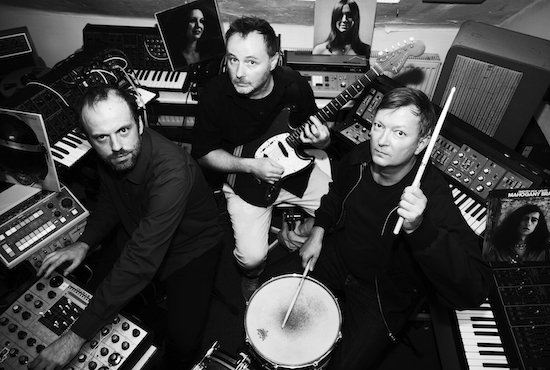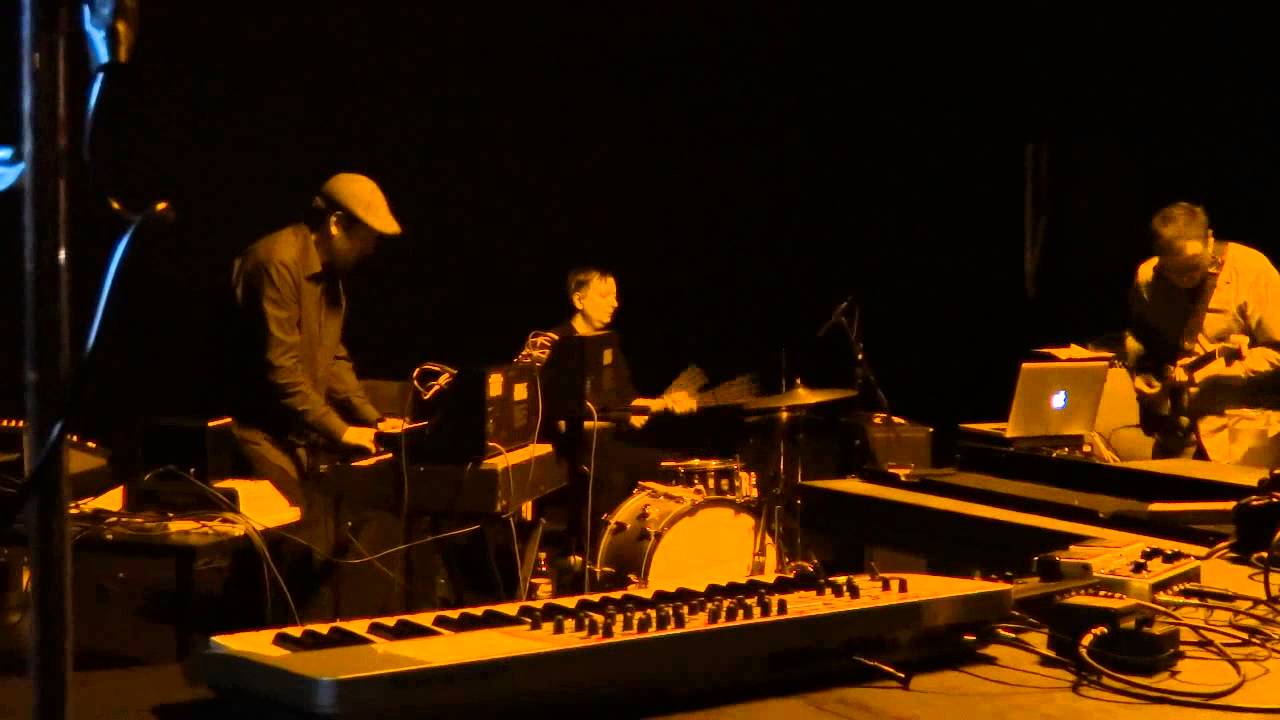In the first instalments of the Internationale Situationniste, Giuseppe Pinot-Gallizio, and several others, proposed the "destruction of the subject" and avowed the usage of contemporary machines to consciously organise what the Surrealists had previously experienced as random or as the marvellous. Accordingly, Gallizio developed the idea of "industrial paintings" as a rejoinder to the gradual diminishing of surrealism’s subversive potential and its assimilation into commercial interests. Gallizio exhibited this industrial painting at the Galerie Rene Drouin, Paris in May 1959, the gallery having been detourned and deconstructed into what was dubbed the Cavern of Anti-Matter.
Now, when I speak to Tim Gane in Berlin some fifty-five years later about his new band – also titled Cavern of Anti-Matter – he is loathe to attach any significance to the nomenclature he chose for this wonderfully invigorating spin through the more outre elements of Krautrock and electronica. And perhaps he’s right; it might be glib to draw parallels with the folding of his previous band, Stereolab, and Gallizio’s attempts to distance himself from the softening of Surrealism and instead forcing the hand of chance by re-discovering some radical new impulse for his output.
But then again, Tim Gane has never been a man to create a band by taking a few hip references and putting them together. There’s far more to Cavern of Anti-Matter – and, indeed, Stereolab and McCarthy – than that. Gane has consistently proffered a fusion of concept and instinct, maintaining a voracious appetite for sonic byways in tandem with a focused understanding of his own sound. These sonic byways traversed through systems music, free jazz, French chanson, motorik and avant electronica, offering a seemingly limitless storehouse of influences yet Gane always seemed wary of reductive classification. As he is quick to point out, his music is often created due to serendipity rather than concentrated aforethought: the random and the marvellous.
Just as Stereolab enamoured themselves with vinyl junkies everywhere apropos their propensity for limited edition releases, collaborations and one-off 7"s, Cavern of Anti-Matter are navigating a similarly arcane route, releasing their debut mini-album Blood-Drums last year on German label Grautag, an ‘Interlude Music’ 12" and now, the magnificently titled ‘Total Availability And The Private Future’ on film-maker Peter Strickland’s Peripheral Conserve label, adorned with some startling cover art from Ghost Box man Julian House. The band currently comprises Gane along with one-time Stereolab drummer Joe Dilworth and Holger Zapf, a trio that showcase a restless, untidy experimentalism, shorn of excess; a shimmering, avant electro-pop workout on ‘Total Availability…’ and its B-side ‘Cluster of Rainbows’.
The Cavern of Anti-Matter is the most blatantly band-orientated project you’ve embarked on since Stereolab. Is this new outfit a peripheral project or is it somewhat more full-time?
Tim Gane: It’s the only thing I’m doing which is like a band. Everything else is either soundtracks or installations. In that way, it’s the main thing I’m doing. It only started about a year ago and kind of drifted [into something more significant]. I didn’t plan it; I had got tired of touring and being in a band. It’s going to get more intense this year, we’re working on an LP now and we’re starting to do more gigs. It’s quite a lot of fun as we get asked to play some strange places… nothing seems typical and I don’t want to go through the whole circuit again, which is something I hope people understand! But I really enjoy thinking about being in a group again.
In terms of being in a group, was there a gradual winding down of Stereolab or was it a somewhat more abrupt ending for the band?
TG: It was gradual – we were still doing Stereolab stuff up until 2010, way after the album [2008’s Chemical Chords] and there was an album [Not Music] after that which was an extra, bonus record of stuff we didn’t finish mixing in time. So, it’s not been that long and then we did a few tours and gradually wound down. The last tour we did was in Japan and that was the stop. In a year’s time, the re-issues will be out, which I’ll have to master so it’ll come swinging around again. But it definitely wasn’t like any absolute split, we reasoned it out – very like McCarthy’s demise, in fact.
I guess the official term these days appears to be hiatus…
TG: Well, that’s not the term I used. I said ‘it stopped’! It’s a bit like… it doesn’t seem to end anymore, does it? The idea was that there would be this other record coming out and maybe if something really musically interesting [was offered to us], we’d maybe do it again. I’m not against the idea of it, I just wanted to stop really. There are more complicated reasons but the simple reason is just that. But yeah, in the modern parlance, ‘hiatus’ might be the word!
The Cavern of Anti-Matter material does seem overtly influenced by your living in Berlin.
TG: [sighs] Really?
Yeah… are you grimacing at that?
TG: [laughs] Well, it’s just one of those questions where I didn’t think about that at all until you just said it. So, I don’t know the answer. You’re maybe more observant about it than I am! Or maybe a listener is more observant. I think there’s some clichés that were written about Cavern so far and they were kind of planned, embedded in the music and in the way the record was stylised. I’ve always had a natural inclination to mess around with these concepts of genres – which is something Stereolab did a lot and – it always disturbs me that people like to naturally put things in a place all the time. The Cavern sound is a little bit more electronic and it came about really, really quickly because I was asked by a German label [Grautag], run by an artist, Nicolas Moulin, who do sort of futuristic music, to do a double album and my instinct was to mess around with all these sequencers and old gear – I did it really quickly in three weeks and that was the sound. The only change was to accommodate playing live, so I asked Joe [Dilworth] and Holger [Zapf] and suddenly the band was born! But that wasn’t in my head at all before we did it; in fact it was going to be a completely anonymous thing. So it’s difficult to go back and say it’s cold, or electronic, but it was what someone asked for.
Is the Cavern essentially a vehicle for you or is it more of a band effort?
TG: Everyone is on board now, I just set up central ideas. We did a 12" which came out [‘Interlude Music’], which was an improvised one. That was just to make some music to go between the songs because we have really long gaps in the gigs with all these changing [instruments] and all these wires, it’s quite old style. So I just improvised with Holger but someone wanted to release it. I generally just come up with the rough basic ideas and we just improvise around that. And that’s the way I want to do it, really by not having so many fully-formed songs. Having someone sit down with a guitar and strumming and instigating songs is something I don’t want to do so much anymore. I don’t find it interesting to do.
That approach harks back to the McCarthy era; in fact, those albums have also been just reissued as well. Is it something you look back fondly on?
TG: I don’t really think about it. I rarely listen [to the albums]. I liked it, it was the only band I’ve ever been in that was like a proper band: four people with the same input, the only band I was ever in where we thought we would be famous. We thought we were gonna be on Top Of The Pops! Which is something that didn’t quite happen with any of the bands I’ve been in, although we did come quite close with Stereolab which was something I didn’t [previously] think about at all. I’ve good memories and bad memories of McCarthy; I think the records do some sort of justice but I don’t think they quite grab the excitement [of the band]. The first song I ever wrote was a song called ‘Red Sleeping Beauty’, and that was my attempt to show Malcolm [Eden, McCarthy singer and guitarist] that I actually could write music because prior to that I was doing electronic stuff. So I did this riff and this song and that gave us the idea to make a band together. We won’t reform though! We have been asked to do tours of Denmark and stuff like that but I’ve always said no. I’m not sure if I’m the only one who said no but I can’t go back to the past. Also, I don’t have time.
Cavern of Anti-Matter sounds like it benefits from a more random approach to songwriting. Is there also a certain freedom playing with relatively new, or even less, people?
TG: Well, towards the end of Stereolab, I was deliberately causing so many problems on purpose [in terms of songwriting techniques]. I tripped myself up from about 2004 onwards; everything was really just a game from that point. I knew that it was in a sense, you can’t fight it anymore. I always had a sense of people, especially when we played live. At the end of the band, Stereolab were as good as we ever were – in fact much better than we were, very intense. I always judged it on intensity rather than playing well. From some point onwards, we never wavered. Where we did waver – or, at least, me personally – I couldn’t find any more what to do with the idea of the band. My natural tendency was to make it much more abstract, but then again that was not the Stereolab sound and you get all this weight of your past pressing down on you. So, for me, what’s free about Cavern of Anti-Matter is no one has any expectations about it; in fact, I’d prefer if people didn’t even know I was in another band! Which is silly to say and almost impossible to achieve but I really don’t want people to look at this and reference what I’ve done before as that sets up another whole bunch of parameters. I don’t try to run away from the type of music I always end up messing around with but, at the same time, I’m not pushing it. Not pushing any connections, that people may make.
So, by the time of Chemical Chords, do you think there was a sense that Stereolab couldn’t help but sound anything like Stereolab? That the band’s sound had become so defined that there was no way out?
TG: You could argue that but I think that’s not true. The recordings Stereolab were making were getting more and more avant-garde. In fact, for that last album, no songs were actually written. Everything was done by chance. I put fifty different chords on paper and I mixed with fifty different rhythms from drum machines or samples and we picked them out randomly and put them together, and then we decided to record only on piano or vibraphone and every song existed originally like that. I think that was a really good method! And then we had to add things to them so I made some more rules… but it still came out sounding like [it did] and that’s when I knew things needed to change. I couldn’t circumnavigate around this thing anymore no matter how much I tried to set up obstacles for myself. So, the band’s sound just comes out and, as soon as Laetitia starts singing, it sounds like Stereolab and that’s great but it’s more difficult in other ways because you’re just really stuck.
Cavern of Anti-Matter is entirely instrumental so far…
TG: It wasn’t deliberate. But I’m really enjoying being instrumental, although we’ve only played about seven gigs. Sometimes I’m thinking I miss vocals but it’s more on the record I’m not looking for vocals; I might ask someone to do it if it suggests itself although it won’t be myself! It solves problems and makes problems in that it changes the way you look at stuff. Cavern Of Anti-Matter is based around setting up little rhythmic cells and expanding on them in little ways, splitting the melody and stretching out. The melodic movement is much slower due to the lack of words. At the moment, the Cavern sound is more what I want to do. If I want to make a fifty-minute track, or a five-minute track, or a five-second track, I can do that! In Stereolab, every album always had a very long song, I was always trying to make room for everything. It definitely wasn’t like a trap but it was becoming more difficult.
You’ve been long associated with quite specific, almost onomatopoeic, song and album titles. But is the Cavern of Anti-Matter a direct reference to the Situationists?
TG: Yeah, well sort of. I just picked it because I like the sound of the words! I knew what it was referring to but that wasn’t really relevant, I’m not making any connections!
It’s a great name, nonetheless.
TG: I remember it from years ago. I saw the title when I was reading something, just memorised it and it then suddenly came up. It sums up in a way the music sounds – or, a band with that name, what would their music sound like? With Stereolab and the names of the songs, you don’t need to look behind the words to see where they came from, it’s not really relevant. It’s just the sound or the way they go together.
Well, you’ve probably reached some sort of peak in terms of song-titles with ‘Total Availability And The Private Future’!
TG: [laughs] I was thinking about these little record labels that are out now and someone asked me to do something that was [limited to] twenty copies, which I found kind of funny, but I also had to think how to make it work. And all of a sudden I just had a [fabricated] name for the label that would do that kind of thing and it was ‘Total Availability’ and then when I had to think of a title for the 7", it came flooding back again.
‘Total Availability And The Private Future’ is out now on Peripheral Conserve




